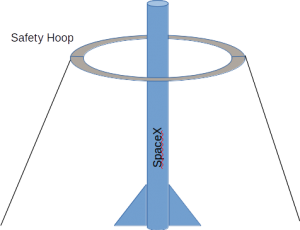How SpaceX Could’ve Easily Avoided the Crash
 The recent SpaceX failure could have been easily avoided by using a cheap simple device they could have figured out in a few minutes by using Predictive Innovation.
The recent SpaceX failure could have been easily avoided by using a cheap simple device they could have figured out in a few minutes by using Predictive Innovation.
The goal of landing the rocket vertically is both to reuse the rocket on Earth but also to develop the ability to land and return from the Moon, Mars, or asteroids to be mined. So they don’t want to only avoid damaging the rocket during landing, they want to build a rocket that is flexible enough to take off, land, and take off again on a wide range of surfaces. A lot can be learned from failures but there is no point destroying the rocket just to learn a little more.
What is the cheap simple solution for SpaceX?
The solution is like a large basket ball hoop over the landing pad. The rocket would land the same way and in the same place but first go through the hoop. The hoop should be large enough to not interfere with positioning and landing but small enough and high enough to catch the rocket if it tipped over. This protects the rocket from smashing on the landing pad and exploding. It would also allow all the data to be collected to learn how to land without the hoop. At the point the rocket falls over the experiment failed so nothing new can be learned. No point in risking damage to the rocket after the lesson is learned.
There is even a similarly cheap & easy way to use this concept for landing on uncharted territory such as Mars. I know that Elon Musk likes using first principles to innovate. The first principles of information is the basis of Predictive Innovation. Elon, give me a call, I also have a patented way to make solar panels for $0.25 / kW and a way to turn eWaste in to precious metals and plant food using 1/10th the energy of other less environmentally friendly systems.
P.S. This offer isn’t exclusive to Elon, unless he calls me first 😉
P.P.S. I can also help your organization with your seemingly impossible problems with a 100% guarantee.
Abundance Based Intellectual Property System
The intended purpose of intellectual property laws is to promote discovery and encourage sharing of ideas. A system that rewards great discoveries and also makes the realization of the ideas available to as many people as cheaply as possible is the ideal system. Using the concepts of Abundance that system can be achieved.
The patent and copyright system creates artificial scarcity. Its stated goal is to promote the sharing of ideas but it does not work. Its not just broken, it was wrong from the start. It assumes that good ideas are scarce and the only way to get people to share their ideas is to give them a monopoly, creating a temporary scarcity.
It’s absurd to claim information as property. If someone said they owned the number 3 and no one can use it without their permission, they would be laughed at or even locked up for being insane. The patent and copyright system grants ownership to information. That contradicts the goal of promoting discovery and sharing.
What is Abundance? It starts with information.
Originally a blog post 2007 Jan 22
Since publication of “Free” and Zeitgeist Addendum a lot of people are finally talking about abundance and how it turns economics on its head. So I thought I would update my original post with a video.
Few people understand how to create abundance so I will be spending more time explaining it with blog posts and videos.



 Predictive Innovation Training
Predictive Innovation Training Predictive Innovation: Core Skills Book
Predictive Innovation: Core Skills Book RoundSquareTriangle.com
RoundSquareTriangle.com